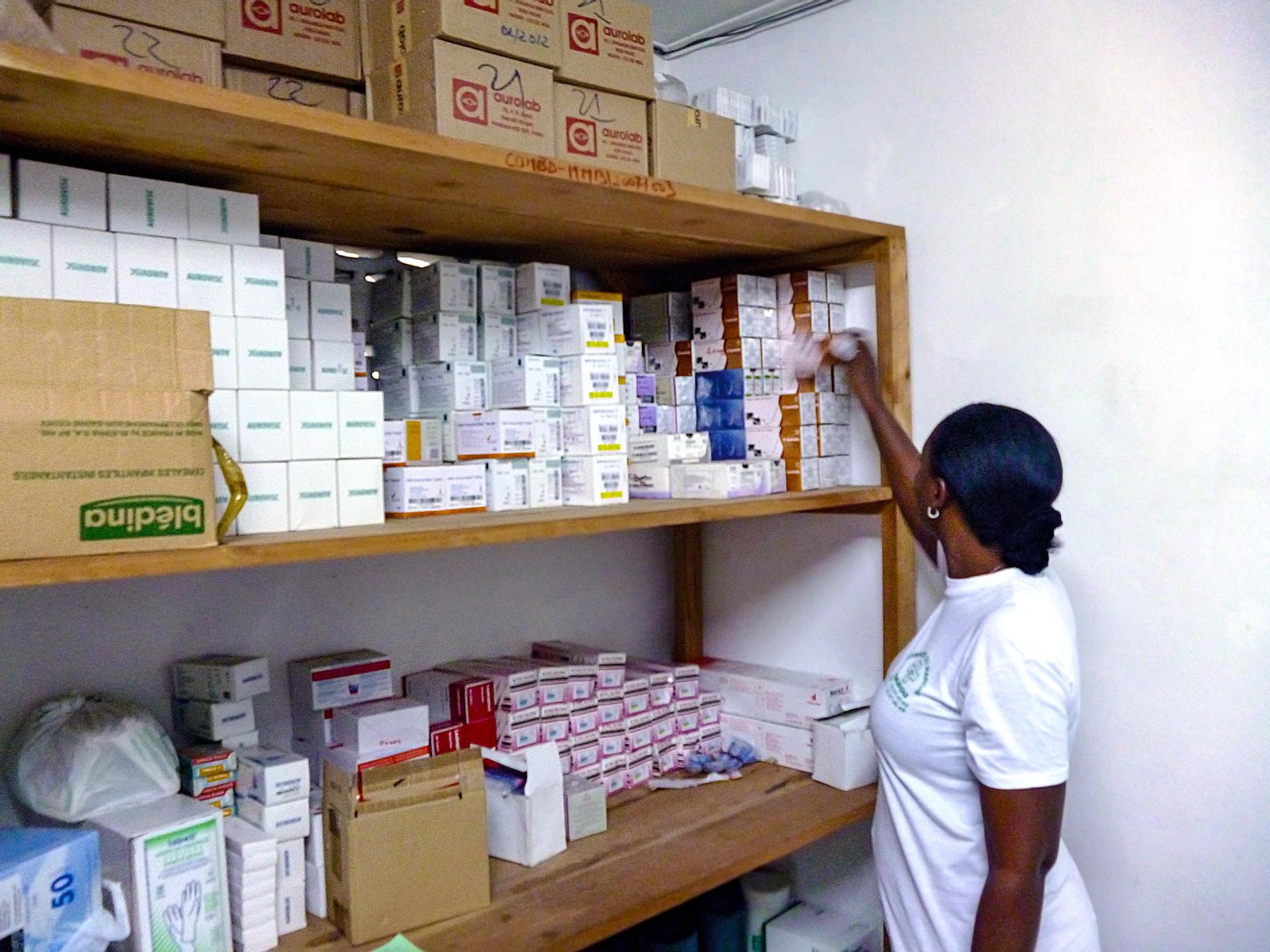Blog
Tackling corruption in Zimbabwe's National Pharmaceutical Company – NatPharm

In December 2020, representatives from Zimbabwe’s National Pharmaceutical Company (NatPharm), the Zimbabwe Ministry of Health and Child Care, (MoHCC), the Auditor General, civil society organisations (CSOs) and development partners held a virtual workshop to discuss the challenges of corruption at NatPharm and to identify ways to strengthen anti-corruption in the company.
Corruption challenges at NatPharm
NatPharm is a not-for profit company, responsible for procuring and distributing all drugs and medical supplies to public health institutions in Zimbabwe. It faces numerous corruption challenges, including bribery, theft, fraud, falsification of information, falsified medicine, and undue influence in decision-making. These problems are found in three parts of the business in particular:
- procurement (purchasing of the drugs and commodities)
- warehousing or inventory (proper storage of medicines)
- distribution (moving supplies from a central warehouse to health institutions).
Bid-rigging is common, and a number of procurement contracts have been awarded through bribery, nepotism, or extortion of public officials. For example:
- The former Minister of Health was charged with awarding a tender of US$20m to a Hungary-registered firm without going through the proper procurement process.
- A US$1m contract to supply personal protective equipment to the Ministry of Health was awarded to President Mnangagwa’s son Collins, allegedly without a competitive bidding process.
- The president’s bodyguard Valdano Brown won similar Covid-19-related contracts; again (it is alleged) with no proper bidding process.
- And in July 2020 seven NatPharm managers were fired for allegedly awarding a US$60m tender to Drax International – a company which was less than two weeks old.
Procurement-related corruption occurs after the bidding process as well, including false invoicing and altering contract agreements.
Deliberate errors in the stocking or recording of medical supplies are a common form corruption in warehousing. Members of a parliamentary committee, for example, were shocked to discover laboratory equipment hidden under expired drugs during a visit to NatPharm. The improper handling of expired drugs themselves – which are sold on to private pharmacies instead of being destroyed – is also cause for concern.
In distribution, corruption occurs when stolen medicines are sold on the black market or kept for personal use. In addition, falsified and sub-standard medicines can enter the health system through the bribing of medicine control officers.
Measures to counter corruption in NatPharm
To curb corruption in procurement, NatPharm has developed a sound internal procurement system based on the 2017 Procurement Act. The Act established an adjudication committee, composed of experts from various departments, to oversee procurement; its membership changes each year. A separate procurement review committee evaluates the whole process by analysing e-procurement data and the TIPOFFs whistleblowing system. The Act also makes individuals accountable in cases of corruption.
Unfortunately, these mechanisms are not as effective as they could be because the committees still sometimes receive political directives to award tenders to politically connected companies without following the Procurement Act procedures.
To curb corruption in warehousing, NatPharm has improved security at its sites, instituted proper waste management and separation of expired medicines, and begun quarterly stock-takes. These measures are bearing fruit: there are fewer incidences of drugs being stolen from the warehouses or of expired medicines on the market.
NatPharm has been tackling corruption in distribrution by tracking delivery vehicles, improving security at loading, and making receipt and invoicing mechanisms more robust. These changes have not only reduced the theft of medicines, but also improved the efficiency of the logistics system.
Political interference casts a shadow
While significant progress has been made in countering corruption, one of the most pressing challenges is that oversight bodies can make it difficult for NatPharm board members and management to carry out their duties effectively. Board members and management have faced suspension or firing when they try to follow established rules or ignore ‘informal’ instructions and political pressure.
An example of this kind of political interference came in February 2021, when the Minister of Health dissolved the NatPharm board and fired managers without providing a clear reason: a destabilising move, just as the country was fighting to contain a Covid-19. Such overt interference in NatPharm – and a political culture in which informal pressures override formal rules – undermine anti-corruption efforts in the company. It can also lead to a mass exodus of good technical staff and encourage rent-seeking behaviours once staff know that management is dysfunctional.
Bad publicity, and a widespread sense that funds are being misused or misappropriated, also continue to damage NatPharm’s reputation, thereby reducing public confidence and partners’ trust in the institution.
Donor support for improving efficiency and reducing wastage and corruption at NatPharm
Development partners from the UK, EU, Sweden, Ireland and the US, as well as the UNDP, the Global Fund and the World Bank, have been providing technical expertise and capacity building to NatPharm for the past 15 years. This has taken the form of upgraded ICT systems and improved logistics and supply-chain management, among many other measures.
Partners have also supported efforts to address corruption in NatPharm and the health sector more widely. US and UK partners in particular are supporting anti-corruption civil society organisations (CSOs) to publicise corruption issues in NatPharm and push for reform. For example:
- CSOs are advocating for a whistleblower protection law and for the Zimbabwe Anti-Corruption Commission (ZACC) to enforce anti-corruption measures in NatPharm.
- The Zimbabwe Coalition on Debt and Development (ZIMCODD) COVID 19 resources tracker aims to strengthen the transparency and accountability of the government by empowering citizens with information on the allocation and use of Covid-19 resources.
- The Magamba Network and other CSOs are running a #WhereAreOurVaccinescampaign focused on ensuring a clear and transparent vaccine roll-out plan.
The way forward
The Government of Zimbabwe, assisted by development partners, has made significant efforts to address pharmaceuticals corruption in Zimbabwe, but much remains to be done. Participants in the December 2020 workshop agreed on the following recommendations that could help to strengthen anti-corruption in NatPharm and the Zimbabwe health sector in general:
- Beneficial ownership: The government should implement beneficial ownership standards and the details of procurement contracts should be published online for improved transparency and accountability.
- E-procurement: A transparent e-procurement system, with open contracting and integrity pacts, could reduce unconscious bias and errors, as well as corruption.
- Whistleblower protection: Zimbabwe urgently needs a law to protect whistleblowers, and policies to encourage the public to report corruption.
- Conflict of interest policy: The existing policy on conflicts of interest should be properly enforced. Procurement committee members should declare any conflicts and enforce sanctions where proper procurement procedures are not followed.
- Coalition building and sectoral approaches: The Coalition for Accountability, Transparency and Anti-Corruption in Health (CATCH) Alliance brings together the World Health Organization, World Bank, UNDP and the Global Fund through their shared vision of integrating anti-corruption, transparency and accountability in the health sector. The alliance is well-placed to support anti-corruption efforts in Zimbabwe, by unifying multiple sectors to address shared problems that demand collective action.
- Political realities:Political interference is one of the biggest challenges NatPharm faces, yet political will to tackle corruption is limited. It is therefore important to find ways of incentivising politicians to align with anti-corruption laws and policies. Aligning anti-corruption reforms with political incentives (for example, by illustrating how improved health outcomes may improve political popularity) could be one way to get politicians to ‘walk the talk’ when it comes to corruption.
Disclaimer
All views in this text are the author(s)’, and may differ from the U4 partner agencies’ policies.
This work is licenced under a Creative Commons Attribution-NonCommercial-NoDerivatives 4.0 International licence (CC BY-NC-ND 4.0)


